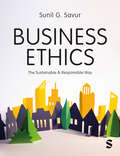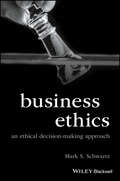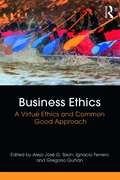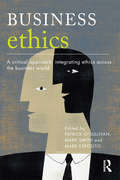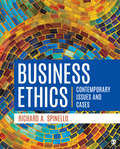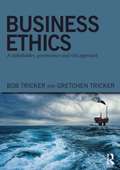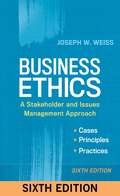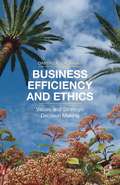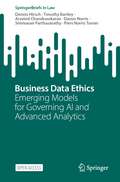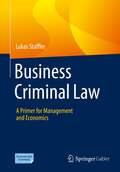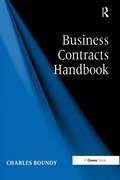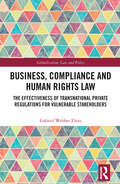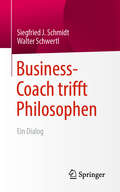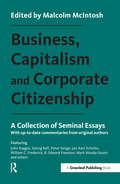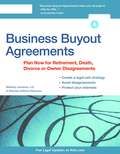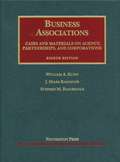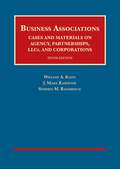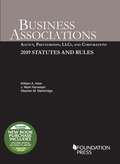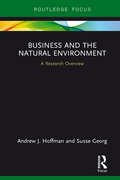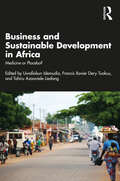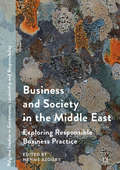- Table View
- List View
Business Ethics: The Sustainable and Responsible Way
by Sunil G SavurBusiness Ethics: The Sustainable and Responsible Way provides a fresh, contemporary, and hands-on approach to business ethics, emphasizing practical skills. This practical approach is supported through a rich array of short and long case studies from across the globe, including countries such as the UK, Australia, the US, India, China, Nigeria and Ghana. Cases feature companies such as Patagonia, the Aravind Eye Clinic, Merck and LEGO and examine topics such as the gig economy, fast fashion, electric vehicles, artificial intelligence, and space exploration. Accompanying questions also encourage reflection and the skills needed to apply theory to real-life scenarios. This textbook is suitable for undergraduate and postgraduate students of business ethics, as well as those studying business and society, corporate social responsibility, sustainability, and responsible management. Online resources include PowerPoint slides and a Teaching Guide. Dr Sunil G. Savur is a Business Ethics lecturer and researcher at the University of South Australia, Adelaide.
Business Ethics: The Sustainable and Responsible Way
by Sunil G SavurBusiness Ethics: The Sustainable and Responsible Way provides a fresh, contemporary, and hands-on approach to business ethics, emphasizing practical skills. This practical approach is supported through a rich array of short and long case studies from across the globe, including countries such as the UK, Australia, the US, India, China, Nigeria and Ghana. Cases feature companies such as Patagonia, the Aravind Eye Clinic, Merck and LEGO and examine topics such as the gig economy, fast fashion, electric vehicles, artificial intelligence, and space exploration. Accompanying questions also encourage reflection and the skills needed to apply theory to real-life scenarios. This textbook is suitable for undergraduate and postgraduate students of business ethics, as well as those studying business and society, corporate social responsibility, sustainability, and responsible management. Online resources include PowerPoint slides and a Teaching Guide. Dr Sunil G. Savur is a Business Ethics lecturer and researcher at the University of South Australia, Adelaide.
Business Ethics: An Ethical Decision-Making Approach (Foundations of Business Ethics)
by Mark S. SchwartzBusiness Ethics: An Ethical Decision-Making Approach presents a practical decision-making framework to aid in the identification, understanding, and resolution of complex ethical dilemmas in the workplace. Focuses exclusively on three basic aspects of ethical decision making and behavior—how it actually takes place, how it should take place, and how it can be improved Uses real-life examples of moral temptations and personal ethical dilemmas faced by employees and managers Discusses the biases, psychological tendencies, moral rationalizations, and impact of self-interest as impediments to proper ethical decision making Includes relevant examples of ethical misconduct and scandals appearing in the news media
Business Ethics: A Virtue Ethics and Common Good Approach
by Alejo José Sison Ignacio Ferrero Gregorio GuitiánCan business activities and decisions be virtuous? This is the first business ethics textbook to take a virtue ethics approach. It explains how virtue ethics compares with alternative approaches to business ethics, such as utilitarianism and deontology, and argues that virtue ethics best serves the common good of society. Looking across the whole spectrum of business—including finance, governance, leadership, marketing and production—each chapter presents the theory of virtue ethics and supports students’ learning with chapter objectives, in-depth interviews with professionals and real-life case studies from a wide range of countries. Business Ethics: A Virtue Ethics and Common Good Approach is a valuable text for advanced undergraduates and masters-level students on business ethics courses.
Business Ethics: A Critical Approach: Integrating Ethics Across the Business World
by Mark Smith Mark Esposito Patrick O’SullivanEvents such as Trafigura's illegal dumping of toxic waste in Côte d’Ivoire and BP's environmentally disastrous oil spill in the Gulf of Mexico have highlighted ethical issues in international business at a time when business leaders, academics and business schools were reflecting on their own responsibilities following the global financial crisis. The scope and scale of the global operations of multinational businesses means that decisions taken in different parts of the world have far reaching consequences beyond the national settings where employees are located or where firms are registered and as such, an awareness of these responsibilities needs to be integrated into all levels and all subjects. Using four guiding principles – a critical multi-level approach rooted in the tradition of European social theory, a comparative and international perspective, a global rather than just a European or American stand point and engaging with subject-specific issues this book aims to 'mainstream' business ethics into the work of teachers and students in business schools. This comprehensive volume brings together contributions from a range of experts in different areas of business studies thereby facilitating and encouraging a move away from business ethics being a box to be ticked to being an integrated consideration across the business disciplines. This impressive book brings ethical considerations back to the heart of the business curriculum and in doing so, provides a companion for the progressive business student throughout their university career.
Business Ethics: Contemporary Issues and Cases
by Richard A. SpinelloThe future of the free market depends on fair, honest business practices. Business Ethics: Contemporary Issues and Cases aims to deepen students’ knowledge of ethical principles, corporate social responsibility, and decision-making in all aspects of business. The text presents an innovative approach to ethical reasoning grounded in moral philosophy. Focusing on corporate purpose—creating economic value, complying with laws and regulations, and observing ethical standards—a decision-making framework is presented based upon Duties-Rights-Justice. Over 40 real-world case studies allow students to grapple with a wide range of moral issues related to personal integrity, corporate values, and global capitalism. Richard A. Spinello delves into the most pressing issues confronting businesses today including sexual harassment in the workplace, cybersecurity, privacy, and environmental justice.
Business Ethics: Contemporary Issues and Cases
by Richard A. SpinelloThe future of the free market depends on fair, honest business practices. Business Ethics: Contemporary Issues and Cases aims to deepen students’ knowledge of ethical principles, corporate social responsibility, and decision-making in all aspects of business. The text presents an innovative approach to ethical reasoning grounded in moral philosophy. Focusing on corporate purpose—creating economic value, complying with laws and regulations, and observing ethical standards—a decision-making framework is presented based upon Duties-Rights-Justice. Over 40 real-world case studies allow students to grapple with a wide range of moral issues related to personal integrity, corporate values, and global capitalism. Richard A. Spinello delves into the most pressing issues confronting businesses today including sexual harassment in the workplace, cybersecurity, privacy, and environmental justice.
Business Ethics: A stakeholder, governance and risk approach
by Bob Tricker Gretchen TrickerTraditionally, books on business ethics focus on CSR, companies’ relations with their stakeholders, and corporate citizenship. More recently, green credentials and sustainability have been added to that agenda. Unconventionally, this book argues that business ethics are basic to running business, not a separate subject. They are inherent to the governance and management of every organization, not an optional exercise in corporate citizenship. Business ethics concern behaviour in business and the behaviour of business. Decisions at every level in a company have ethical implications – strategically in the board room, managerially throughout the organization, and operationally in all of its activities. The use, and sometimes the abuse, of corporate power, the process of corporate governance, raises ethical issues. Business involves risk-taking, whether decisions are at the strategic, managerial, or operational level. Exposure to ethical risk needs to be part of every organization’s strategy formulation, policy making, and enterprise risk management. Designed to be read by both undergraduates and postgraduates, this book is a primer on ethics in business. It is also relevant to ethics courses that are now part of many legal, accountancy and other professional examinations. The book is not about moral philosophy, nor does it prescribe appropriate standards of behaviour or recommend economic, legal or political solutions. Rather it enables readers to recognize ethical issues in business, to respond appropriately, and to embed ethics in business processes. The book not only considers what business ethics are, and why they are important, but offers practical approaches on how to develop a successful corporate ethics culture.
Business Ethics
by Joseph W. WeissEthics for Today This is a pragmatic, hands-on, up-to-date guide to determining right and wrong in the business world. Joseph Weiss integrates a stakeholder perspective with an issues-oriented approach so students look at how a business's actions affect not just share price and profit but the well-being of employees, customers, suppliers, the local community, the larger society, other nations, and the environment. Weiss uses a wealth of contemporary examples, including twenty-three customized cases that immerse students directly in recent business ethics dilemmas and ask them to consider how they would resolve them. The recent economic collapse raised ethical issues that have yet to be resolved--there could not be a better time for a fully updated edition of Weiss's classic, accessible blend of theory and practice. New to the Sixth Edition! New Cases! Fourteen of the twenty-three cases in this book are brand new to this edition. They touch on issues such as cyberbullying, fracking, neuromarketing, and for-profit education and involve institutions like Goldman Sachs, Google, Kaiser Permanente, Walmart, Ford, and Facebook. Updated Throughout! The text has been updated with the latest research, including new national ethics survey data, perspectives on generational differences, and global and international issues. Each chapter includes recent business press stories touching on ethical issues. New Feature! Several chapters now feature a unique Point/Counterpoint exercise that challenges students to argue both sides of a contemporary issue, such as too-big-to-fail institutions, the Boston bomber Rolling Stone cover, student loan debt, online file sharing, and questions raised by social media.
Business Efficiency and Ethics: Values and Strategic Decision Making
by Dimitris N. ChorafasBusiness Efficiency and Ethics presents both the theory of business efficiency and ethics, and a wealth of case studies based on practical experience. This unique perspective offers a framework for identifying this behaviour and reestablishing appropriate business behavior standards.
Business Data Ethics: Emerging Models for Governing AI and Advanced Analytics (SpringerBriefs in Law)
by Dennis Hirsch Timothy Bartley Aravind Chandrasekaran Davon Norris Srinivasan Parthasarathy Piers Norris TurnerThis open access book explains how leading business organizations attempt to achieve the responsible and ethical use of artificial intelligence (AI) and other advanced information technologies. These technologies can produce tremendous insights and benefits. But they can also invade privacy, perpetuate bias, and otherwise injure people and society. To use these technologies successfully, organizations need to implement them responsibly and ethically. The question is: how to do this? Data ethics management, and this book, provide some answers. The authors interviewed and surveyed data ethics managers at leading companies. They asked why these experts see data ethics as important and how they seek to achieve it. This book conveys the results of that research on a concise, accessible way. Much of the existing writing on data and AI ethics focuses either on macro-level ethical principles, or on micro-level product design and tooling. The interviews showed that companies need a third component: data ethics management. This third element consists of the management structures, processes, training and substantive benchmarks that companies use to operationalize their high-level ethical principles and to guide and hold accountable their developers. Data ethics management is the connective tissue makes ethical principles real. It is the focus of this book. This book should be of use to organizations that wish to improve their own data ethics management efforts, legislators and policymakers who hope to build on existing management practices, scholars who study beyond compliance business behavior, and members of the public who want to understand better the threats that AI poses and how to reduce them.
Business Criminal Law: A Primer for Management and Economics
by Lukas StafflerThis textbook deals with business criminal law from the perspective of Germany, Austria, Liechtenstein and Switzerland. It primarily addresses students in business and economics (master's programme) as well as business practitioners, but is also meant for lawyers and law students. As criminal law legislators exert considerable influence on economic life, raising and growing awareness in the area of criminal law seems compulsory for future managers and executives. This textbook approaches the legal field less normatively and rather in a practical and entrepreneurial way. Its contents are based on the master level class "Business Criminal Law" at "MCI | The Entrepreneurial School" taught by the author.This textbook has been recommended and developed for university courses in Germany, Austria and Switzerland.
Business Contracts Handbook
by Charles BoundyIf money is the lifeblood of business, contracts are the arteries that help carry it around the commercial body. Anyone in business is liable to have to deal with business contracts, but few are trained to do so. Even those that are trained may have experience in limited areas or in the distant past. But the right contract can make a vital difference, not just to recording and enforcing, if need be, the contract terms, but also in ensuring the agreement deals with the real issues and approaches them in a practical way. Finding help in this area is not easy, as the market tends to offer little between serious academic tomes on the one hand and student summaries geared to exams on the other. Business Contracts Handbook fills that gap, covering both the basics of contract law in an accessible style and using a thoroughly practical approach to understanding and negotiating the key terms in a business contract. If you have little prior knowledge, Charles Boundy's many years of experience in drafting and providing guidance on business agreements of all kinds will enable you to acquire a working background quickly. If you have years of experience you will still benefit from a checklist, a reminder of what is important and why, and an easy reference to up-to-date language and drafting - there is always more to learn.
Business, Compliance and Human Rights Law: The Effectiveness of Transnational Private Regulations for Vulnerable Stakeholders (Globalization: Law and Policy)
by Gabriel Webber ZieroIn recent years, sustainability-related certifications and labels, which are based on Transnational Private Regulations (TPRs), have gained in importance in the areas of business and human rights, particularly from a consumer point of view. However, some question whether companies adhering and complying with TPRs’ normative frameworks are able to effectively meet the expectations deriving from international human rights standards. In response to this question, this book proposes an analytical concept of effective compliance. Based on the elements identified as crucial for achieving effective compliance, it conducts an in-depth analysis of how TPRs’ normative frameworks function in practice and identifies common patterns and challenges. Such inquiry is based on an interdisciplinary methodological approach between law and sociology, seeking not only to comprehend and assess how law is systematised in theoretical terms, but also to understand how it works on the ground. This allows identification of the lack of active and effective participation of vulnerable stakeholders in the discursive processes established and governed by TPRs, such as rule-making and conformity assessment processes, as the main challenge. Based on such evidence, the book addresses the possibilities of overcoming such challenges, proposing that to fully achieve TPRs’ potential from an effective compliance point of view, legal empowerment of vulnerable groups is essential. It concludes by providing key observations and suggestions that contribute to the use of TPRs as instruments in the struggle for rights of empowered vulnerable stakeholders. The book will be of interest to academics, researchers and policy-makers working in the areas of international law, transnational law, sociology of law and human rights law.
Business-Coach trifft Philosophen: Ein Dialog
by Siegfried J. Schmidt Walter SchwertlSJ Schmidt als bekannter Geisteswissenschaftler und Walter Schwertl Praktiker im Bereich Business-Coaching nähern sich in Dialogform der Frage, wie ein Geisteswissenschaftler und ein Praktiker eine hinreichend gemeinsame Konzeption von Kommunikation erarbeiten können. Gerade zwischen hoch abstrakten Theorien selbstreferentieller Systeme und dem, was als systemische Praxis bezeichnet wird, erscheint die Kluft unüberwindbar. Die Autoren spannen einen Bogen zwischen philosophischen Diskursen und Fragen alltäglichen Handelns. Der Hinweis auf die Vorgeschichte des Buches lässt erahnen, dass die Protagonisten Neugierde auf die Argumente des Anderen, Vertrauen und respektvollen Kommunikationsstil der Kluft erfolgreich entgegensetzen.
Business, Capitalism and Corporate Citizenship: A Collection of Seminal Essays
by Malcolm McIntoshIn the first decades of the twenty-first century, the theory and practice of corporate citizenship and responsibility adapted significantly. The pieces in this volume capture the essence of these changes, with illuminating reflections by their preeminent authors on success, failure, learning and progress. Featuring contributions from John Ruggie, Peter Senge, R. Edward Freeman, Jan Aart Scholte and Georg Kell, it charts the rise of corporate citizenship, sustainability and corporate social responsibility. This title is one of a two-volume set: a collection of seminal and thought-provoking essays, drawn from the Journal of Corporate Citizenship’s archive, accompanied by new analysis and reflection from the original authors. Written by some of the most widely recognized academic and business pioneers and leaders of the corporate responsibility and global sustainability movement, the volumes make essential reference texts for anyone interested in the radically awakening new global political economy. The Journal of Corporate Citizenship was launched in 2001 by Founding Editor Malcolm McIntosh and Greenleaf Publishing. Today, it continues to fulfil its mission to integrate theory and practice and provide a home for enlightened transdisciplinary thinking on the role of business and organizations in society.
Business Buyout Agreements: Plan Now for All Types of Business Transitions
by Bethany K. Laurence Anthony MancusoGoing into business with others means taking some risks. Sooner or later, one or more of the owners will want to exit the business (and it may be you). Unless you plan in advance, protracted arguments over the buyout price, payment plans, and outside buyers can threaten the survival of your business. Without an agreement, co-owners may also jeopardize the business by filing for bankruptcy, pledging their business share as collateral, or losing their share of the business in a divorce. Business Buyout Agreements walks you through the creation of a buy-sell agreement--a sort of "premarital agreement" for your business--that protects everyone's interests. The book includes a fill-in buy-sell agreement that can be tailored for owners of corporations, LLCs, and partnerships.
Business Associations: Cases and Materials on Agency, Partnerships, and Corporations (Eighth Edition)
by William A. Klein J. Mark Ramseyer Stephen M. BainbridgeWith the prior edition of this concise, up-to-date casebook having been adopted at over 100 law schools, the eighth edition preserves the authors' tradition of providing a comprehensive overview of agency, partnership, and corporation law. It also continues to emphasize six basic editorial principles: Be lean but not mean, cases edited ruthlessly to produce a readable and concise result. Facts matter, so they are included in all their potential ambiguity. Bring a planner's perspective to the table through extensive use of transactionally-oriented problems. It's a casebook not a treatise. No long, stultifying textual passages. Provide the cases and let the individual teacher use them as he or she sees fit. Try to find cases that are fun to teach. Great facts or a clever analysis are always given first priority in case selection. Provide a teachers' manual that goes into great depth, with analysis of every case and, whenever applicable, offering the disparate views of each author. An exhaustive teachers' manual extensively discusses every case and provides answers to every question in the text. One feature that many adopters find especially helpful is that all three editors give their own approach to the cases, showing the different ways in which the same case can be taught. Annually updated PowerPoint slides cover almost all sections of the book and feature an extensive use of data, graphics, and photos.
Business Associations: Cases And Materials On Agency, Partnerships, LLCs, And Corporations (University Casebook)
by William Klein J. Ramseyer Stephen BainbridgeWith the prior edition of this concise, up-to-date casebook having been adopted at over 100 law schools, the tenth edition preserves the authors' tradition of providing a comprehensive overview of agency, partnership, and corporation law. It also continues to emphasize five basic editorial principles: Cases edited ruthlessly to produce a readable and concise result. Facts matter, so they are included in all their potential ambiguity. Bring a planner's perspective to the table through extensive use of transactionally-oriented problems. It's a casebook not a treatise. No long, stultifying textual passages. Provide the cases and let the individual teacher use them as he or she sees fit. Try to find cases that are fun to teach. Great facts or a clever analysis are always given first priority in case selection.
Business Associations: Agency, Partnerships, LLCs, and Corporations and 2019 Statutes and Rules
by Mark Ramseyer Stephen Bainbridge William KleinThis statutory supplement includes statutes and rules relevant to all business entities. It is suitable for use with all textbooks and casebooks for such courses. It includes all updates to the statutes and rules.
Business as an Instrument for Societal Change: In Conversation with the Dalai Lama
by Sander TidemanBusiness as an Instrument for Societal Change: In Conversation with the Dalai Lama is the result of two decades of research and dialogue with His Holiness the Dalai Lama and other leaders in business, government, science and education. Author Sander Tideman, a lawyer and banker who has maintained a friendship with the Dalai Lama over all these years, presents a practical framework and methodology to develop a new kind of leadership - one fit to repurpose the business world and tackle escalating social, economic and environmental needs. The Dalai Lama rarely speaks directly on the topics of business, leadership and economics. Yet in the dialogues recounted here, his wisdom - combined with key insights from business and public leaders -creates a unified shift towards a consciousness of interconnectedness, offering profound insights for practitioners and general readers alike. Tideman unites the scientific worldviews of physics, neuroscience and economics with the positive psychology of human relationships, and ancient spiritual wisdom, to formulate practical business leadership solutions. While recognizing the need for change in external structures and governance, Tideman highlights the importance of opening our minds, and connecting inner and outer spirituality. At the same time, he focuses on concrete practices for winning the hearts and minds of employees, customers, communities, and society at large, while addressing deep-rooted problems such as extreme social inequality and continued financial collapses. At the heart of this book lies the journey to discover our shared purpose. This ignites new sources of value creation for the organisation, customers and society, which Tideman terms 'triple value'. We can achieve triple value by aligning societal and business needs, based on the fundamental reality of interconnection. Business as an Instrument for Societal Change: In Conversation with the Dalai Lama is a readable and intelligent exploration of how leaders can actually help to shape a sustainable global economy by embracing innate human and humane behaviour. It is also Tideman's fascinating personal journey, which brought him to question the underlying motivations and goals of business leadership and to seek a new paradigm for a more sustainable approach. Reflecting Tideman's sharp perceptions and infused with the Dalai Lama's unmistakable joy, this book has the power to change your way of thinking.
Business and the Natural Environment: A Research Overview (State of the Art in Business Research)
by Andrew J. Hoffman Susse GeorgThe fields of corporate environmentalism, green business and corporate sustainability have grown significantly over the past twenty-five years, such that the academic research domains of business decision-making, accounting, organizational behaviour, and the protection of the natural environment have developed into maturing areas of study within the management sciences. Business and the Natural Environment: A Research Overview is a summary of the research thus far on this topic, offering a structure for understanding its emergence and growth, the multiple facets that make up its present state and a glimpse into the future of where it may be going. Along the way, the authors provide a compendium of its important works to help situate the interested reader in the landscape of the field. One important element of this work is its topical relevance; issues of environmental protection (and more recently sustainability) are critically important in today’s worlds of business, policy, and public understanding. Scholars who choose to enter this domain have much to offer of societal value while at the same time, entering a non-fully legitimate research stream that can lead to academic success (such as tenure). This shortform book provides a research map for both new scholars who wish to enter the field and more seasoned researchers who wish to understand one view of the landscape and how they might fit within it. This expert survey of the existing literature brings the research story into the age of the Anthropocene and is essential primary reading.
Business and Sustainable Development in Africa: Medicine or Placebo?
by Uwafiokun Idemudia, Francis Xavier Dery Tuokuu, and Tahiru Azaaviele LiedongThe book offers new critical insights into the relationship between corporate social responsibility (CSR) and sustainable development in Africa. The extent to which CSR initiatives can contribute to sustainable development in Africa remains debatable. This book examines in a very clear structure how, when, and whether CSR initiatives are able to contribute to the realization of the sustainable development goals, peace, and environmental sustainability at the micro-levels of society. It also explores some macro-level issues such as the relationship between taxation and CSR, CSR and human rights, and CSR and public governance and, in so doing, challenges existing CSR dogmas. With themes aligned with the UN Sustainable Development Goals (SDGs), this book provides useful practical guidance for policymakers and business leaders seeking to better understand the strength and limitations of CSR as a vehicle for advancing sustainable development in Africa. It will also appeal to scholars, researchers, and students of African studies, development studies, international business, strategic management, and business and society.
Business and Society in the Middle East: Exploring Responsible Business Practice (Palgrave Studies in Governance, Leadership and Responsibility)
by Nehme AzouryThis book discusses the unique relationship between societies and businesses in the Mediterranean region, with contributions from public figures and academics from Middle Eastern and Arab societies, as well as from North America and Europe. This blend of expertise and knowledge focuses on common business practices and their effect on society in Mediterranean countries, and aims to create a bridge between the two. Considering the cultural, social, political, legal and economic impacts and variety, Business and Society in the Middle East is a contemporary and authentic view of how local and traditional aspects of society dictate diversity and homogeneity within businesses.
Business and Society: Ethics, Sustainability and Stakeholder Management (Mindtap Course List)
by Archie B. Carroll Jill Brown Ann K. BuchholtzBUSINESS AND SOCIETY employs a stakeholder management framework. This framework emphasizes a business's social, legal, political, and ethical responsibilities to both external and internal groups that have a stake, or interest, in that business. It is a fundamental goal of the course that students really get that responsible business decision makers strive to balance and protect the interests of various stakeholders-investors, employees, community, environment, etc. An emphasis is also placed on the fact that one needs to understand that business situations will continually arise that will truly test ones values and ethics. <p><p> BUSINESS AND SOCIETY not only exposes students to diverse and important stakeholder and ethical frameworks for considering and protecting stakeholder interests, through its use of cases and other real-world applications, this text enhances the precision with which students think about and practice ethical decision making. Opportunities to apply stakeholder and ethical systems to specific business problems abound, and questions are provided with all cases and applications to focus student reasoning, ensuring excellent preparation for class discussions.
